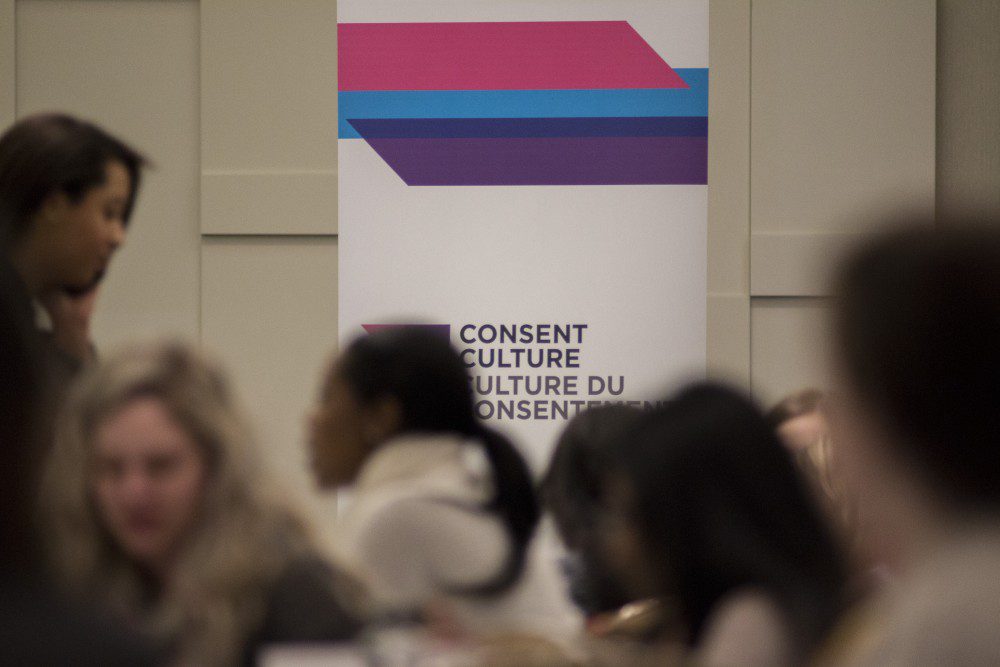Delegates attending a national forum in Ottawa to end sexual violence on college and university campuses have recommended that student voices must be present in all discussions of their schools’ sexual assault policy-making.
The two-day forum, organized by the Canadian Federation of Students, invited student council members from Canada’s post-secondary institutions to join panels and workshops and share their experiences regarding sexual violence on campus.
Overall, delegates said they had encountered resistance from administrations when they expressed a need for a sexual assault policy on campus. Sofia Zaman, a delegate from University of King’s College, said that must change.
“We have to make sure the policy is student driven,” she said. “We have a very clear way of how that approach should be in terms of accessibility and transparency on the part of the administration.”
A fellow student from UKC, Aidan McNally, agreed.
“Students are the experts of what students face,” he said. “Inaction is what we’re fighting against.”
Alexandra Killham attended the forum representing Dalhousie University’s student council. She said she has advocated for anonymous reporting in her school’s sexual-assault policy. She believed that would allow administrations to offer services to specific issues. But she insisted there’s been little or no support from the administration.
“It’s interesting how resistant administration is,” Killham said. “There are some shallow and silly arguments about if it’s anonymous, then everyone will complain about everything, and there will be no merits to the complaint.”
The conference, titled “Consent Culture: A Forum to End Sexual Violence on Campus,” ran Thursday and Friday last week. Another of its focuses looked into education. Delegates brought ideas for consent culture education to one of the workshops that recommended mandatory training to prevent sexual violence during frosh-week orientation. Anne-Marie Roy serves as student federation president at the University of Ottawa.
“We can’t just have a protocol or policy to respond to instances of sexual violence,” she said. “We need to be proactive … and have an educational component to prevent these instances on our campus as well.”
Other delegates said they realized the importance of formulating a sexual assault policy. Nicole Desnoyers, a CFS Ontario women’s representative from the U of O, said she would take what she’d learned back to her campus to spark change immediately.
“My campus doesn’t have a sexual assault policy; we’re about to start the process,” she said. “I have gained ideas around how to work with our admin to build policies on how to deal with sexual harassment on our campus.”
First Nations elder Annie Smith St-Georges and her partner of 43 years, Robert St-Georges, gave closing remarks at the forum. They emphasized the roles that all people have in creating a uniform consent culture. Of the 101 delegates attending the forum most were women.
“Next time, bring a lot more of your friends,” Robert St-Georges said, addressing the men in the room. “It’s time that men get more serious about all of the subjects we talked about. It’s not only a mission for women.”

Annie Smith St-Georges and her partner of 43 years Robert St-Georges performs a traditional aboriginal ceremony.
Pascal Hache, president-elect at the Université de Moncton, was inspired by St-Georges’ words.
“It’s important for men to own this too; and we work together towards a goal,” he said. “As men, you need to listen more than you talk.”
Hache said his school doesn’t have a sexual assault policy. He was motivated to come to this conference because of a statement released by the university which declared there hadn’t been any cases of sexual assault on campus in the past five years.
“It’s hiding your head in the sand,” Hache said. “That’s a problem.”
Anne-Marie Roy echoed the need for education and support for men as significant participants in building consent culture on campus.
“There needs to be awareness around it. There need to be resources to talk about it with men and to support them as well, when they’re reflecting on these issues,” Roy said. “Rape culture is insidious (in) the ways that it has consequences on men and women.”
Bilan Arte, deputy chair of the Canadian Federation of Students, ended the forum with a final note by encouraging delegates to “stand together to build a consent culture.”


